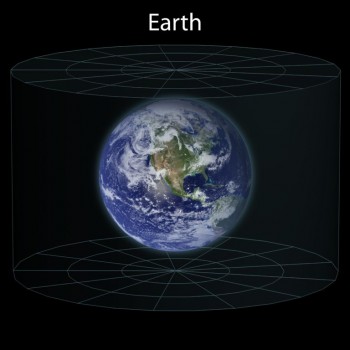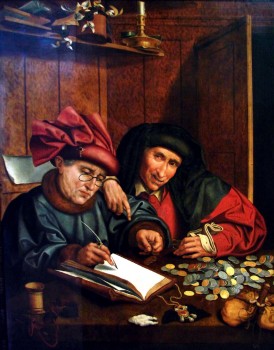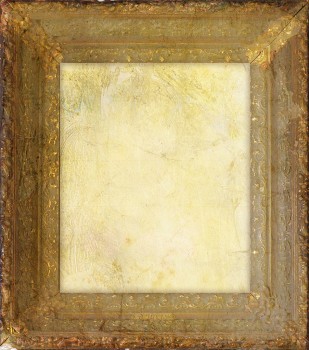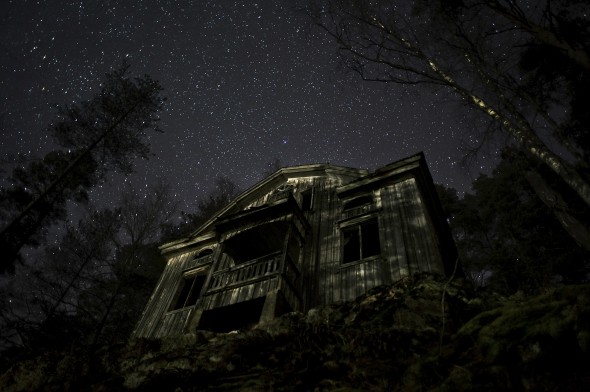Search results for "2010/02/let-us-eat-cake"
Is this all?
10 October 2013 | Extracts, Non-fiction

Earth. Andrew Z. Colvin/Wikimedia
In today’s world, many people find that it is not the lack of something that is problematic, but excess: the same goes for knowledge. According to professor of space astronomy, Esko Valtaoja, knowledge should contribute to the creation of a better world. His latest book is a contribution to the sum of all knowledge; over the course of two hundred pages Valtaoja delves deep into the inner space of man by taking his reader on a brief tour of the universe. Extracts from Kaiken käsikirja. Mitä jokaisen tulisi tietää (‘A handbook to everything. What everybody should know’, Ursa, 2012)
Whatever god you bow down to, you’re probably worshipping the wrong god.
The above is almost the only completely certain thing that can be said about religion, and even it does not encompass any deep truth; it’s just a simple mathematical statement. The world’s biggest religion is Roman Catholicism, which is confessed, at least nominally, by 1.1 billion people. If the Roman Catholic god were the true god, the majority of people in the world are therefore worshipping a false god. (According to the official stance of the Catholic church, the other Christian denominations are heresies, and their believers will be condemned to perdition: extra ecclesiam nulla salus. This inconvenient truth is, understandably, politely bypassed in ecumenical debate. But even if all those who call themselves Christians were counted as worshipping the same god, two thirds of the world’s population are still knocking at the wrong door.)
If you’re a religious person, don’t worry; I’m not blaspheming. And if you’re a campaigning atheist, hang on a minute: all I want to do is to find a clear and undisputed starting point to consider what it is we’re talking about when we speak of religion. More…
Me and my shadow
Hotel Sapiens is a place where people are made to take refuge from the world that no longer is habitable to them; the world economy has fallen – like the House of Usher, in Edgar Allan Poe’s story – and with it, most of what is called a civilised society. A rapid synthetic evolution has taken humankind by surprise, and the world is now governed by inhuman entities called the Guardians. ‘Kuin astuisitte aurinkoon’ (‘As if stepping into the sun’) is a chapter from the novel Hotel Sapiens ja muita irrationaalisia kertomuksia (‘Hotel Sapiens and other irrational tales’, Teos, 2012), where several narrators tell their stories
The fog banks have dissipated; the sky is empty. I cannot see the sails or swells in its heights, nor the golden cathedrals or teetering towers. I would not have believed I could miss a fog bank, but that’s exactly what it’s like: its disappearance is making me uneasy. For all its flimsiness and perforations it was our protection, our shield against the sun’s fire and the stars’ stings. Now the relentlessly blazing sun has awakened colours and extracted shadows from their hiding places. The moist warmth has dried into heat and the Flower Seller’s herb spirals have dried up into skeletons. The leaves on the trees are full of bronze, sickly red and black spots. Though there is no wind and autumn is not yet here, they come loose as if of their own volition, as if they wanted to die.
This morning, as I was strolling up and down the park path as usual, I saw another shadow alongside my own.
– Ah, you’re back! I said. – I wondered what had happened to you after you lost your shadow; how did you manage to change into your own shadow yourself? More…
The Cheap Contractor
30 June 1986 | Archives online, Fiction, Prose
From Kauan kukkineet omenapuut (‘Long-blossoming apple trees’, 1982). Introduction by Arto Seppälä
The men who delivered the hot-water cylinder offered to do the installation as well. I asked how much it would be. They lolled about a bit, exchanged a few private looks, pretended to be thinking. Then one of them fired off a sum. It was three times the quotation I’d already had. They didn’t even look at the location. I told myself I wouldn’t even go to the end of the road with big-dealers like these.
The same evening I rang up ‘a little man’ and told him he could get started as soon as it suited him.
The cheap contractor turned up a couple of days later, driving an elderly van into the yard. I went out. He’d sat himself down in a garden chair near the white lilacs. The morning sun only partially reached there; so half his body was in shade, looking colder than the sunny half. More…
The last melody
30 September 1995 | Archives online, Fiction, Prose
Extracts from the novel Kadotettu puutarha (‘The lost garden’, WSOY, 1995). Introduction by Riina Katajavuori
Their sojourn at the villa extended into the autumn of 1944; the schools did not go back as usual on the first of September. Repair of the university buildings progressed rapidly; the work had begun immediately after the bombing. The Doctor went to town from time to time, but nothing bound the family to it, and he returned to his desk in the attic room and to his solitary walks by the lake. His heart troubled him from time to time. It did not like these walks, did not like exertion; but he had succeeded in concealing the matter from Elisabet. After one particular attack, he had secretly seen a doctor in town, and now, instead of camphor tablets, he always had those little buttons in his pocket, the breast pocket of his waistcoat. He swallowed one from time to time on these expeditions, a pain in his wrists and his eyes staring dimly at a clump of ferns that seemed to have become hazy, or a tree-top that seemed to be falling toward him. He did not wish Elisabet to know. Not this, in Elisabet’s world, not this, in air that was suffused with grief for their dead son Leo, with well controlled and beautifully expressed emotion, with concern for the remaining boy, who was there, on the frontier, with the burdensome and universal tragedy that filled the air as light filled it in daytime. More…
Higher goals
31 December 1987 | Archives online, Fiction, Prose
An extract from the novel Tammerkosken sillalla (‘On Tammerkoski bridge’, 1982). Introduction by Panu Rajala
I had thought there were a lot of books in the libraries in Oulu. But both those libraries were totally overshadowed when, having climbed up to the top of the Messukylä Workers’ House, I began to cast my eyes along the bookshelves in the attic. A tallish and refined-looking librarian responded when I exclaimed aloud.
‘Just under seven thousand volumes altogether. Some of them are out on loan. We’d like to have a lot more books, but getting the money to buy them is like getting water from a stone.’
‘But you’ve already got an incredible amount compared to what we have in the rural library at home… In Taivalkoski during the war all we had was two cupboardsful.’
‘You didn’t have a lot of choice there,’ agreed the librarian. More…
Temporarily out of order
Extracts from the novel Hullu (‘The lunatic’, Teos, 2012). Introduction by Soila Lehtonen
I found myself standing in front of the noticeboard. The rules were on a sheet of paper:
Ward 15 5-C
MEAL TIMES:
Breakfast 8:00 AM
Lunch 11:45 AM
Dinner 4:30 PM
Evening Snack 7:30 PM
COFFEE:
After lunch
We recommend leaving money, valuables, and bankbooks for storage in the ward valuables locker. We take no responsibility for items not left in the locker! Money may be retrieved 1–3 times per day. Use of mobile phones on the ward by arrangement.
VISITING HOURS:
M–F 2–7 PM
Sa–Su 12–7 PM
PERSONAL CLOTHING:
Use of one’s own clothing by individual arrangement. Clothing care individual. Washer and dryer available for use in the evenings after 6 PM.
OUTDOOR RECREATION:
Arranged individually according to health condition. Outdoor pass does not include the right to leave the area.
VACATIONS:
Vacations arranged during morning report, according to health condition.
NOTA BENE!
Smoking is only allowed on the smoking balcony! Smoking prohibited from 11 PM to 6 AM.
Pastor Karvonen available by appointment.
These were impossibly difficult rules. I read them through three times and simply did not understand. ‘Clothing care individual.’ ‘Outdoor pass does not include the right to leave the area.’
What did these sentences mean? With whom did you schedule the pastor and how? And why? More…
Solid, intangible
26 September 2013 | Fiction, poetry
Poems from Mot natten. Dikter 2010 (‘Towards the night. Poems 2010’, Schildts & Söderströms, 2013). Introduction by Michel Ekman
Memory
If you give me time
I don’t weigh it in my hand:
it’s so light, so transparent
and heavy as the thick
shining darkness
in the backyard gateway
to memory
Make or break?
17 November 2011 | This 'n' that

Two tax collectors: anonymous painter, after Marinus van Reymerswaele (ca. 1575–1600). Musée des Beaux-Arts de Nancy. Wikimedia
In Finland, tax returns are public information. So, every November the media publish lists of the top earners in Finland, dividing them into the categories of earned and investment income. Every November it is revealed who are millionaires and who are just plain rich.
The Taloussanomat (‘The economic news’) newspaper offers a list (Finnish only) of the 5,000 people who earned most last year (in terms of both earned and investment income, together with the proportion of income they have paid in tax). You can also search lists of various status and professions: rock/pop stars, media, sports, MPs, celebrities, politicians of various political parties…
So let’s take a look at Taloussanomat’s selected list of authors: number one is the celebrity author Jari Tervo (309,971 euros, tax percentage 45); number two, the internationally famous Sofi Oksanen (302,634 euros, 46 per cent); the next two are Sinikka Nopola, writer of children’s books, (264,000) and Arto Paasilinna (262,300; now after an illness, retired as a writer), translated into more than 30 languages since the 1970s. (The film critic and author Peter von Bagh made almost 900,000 euros – not by writing books, but by selling his share of a music company to an international enterprise.)
As tax data are public in Finland, there’s vigorous and decidedly informed public debate on how much money, for example, directors of public pension institutions and government offices or ministers and other top politicians are paid, and how much they should be paid: what is equitable, what is reasonable? A million dollar question indeed…
Among the European Union countries, it is only in Finland, Sweden and Denmark that there is no universal minimum wage. Here, wages are determined in trade wage negotiations. The average monthly salary in the private sector in 2010 was approximately 3,200 euros. In contrast to that, Olli-Pekka Kallasvuo, the Nokia CEO and President, who tops the 2010 tax list, earned a salary of 8 million last year, because – and precisely because – he was sacked (and replaced by the Irishman Steven Elop).
The CIA’s Gini index measures the degree of inequality in the distribution of family income in a country. The more unequal a country’s income distribution, the higher is its Gini index. The country with the highest number is Sweden, 23; the lowest, South Africa, 65 (data from both, 2005). Finland’s figure is 26.8 (2008), Germany 27 (2006), the European Union’s 34. The United Kingdom stands at 34 (2005), and the USA at 45 (2007). The figure in Finland seems to be on the rise though, as the figure back in 1991 was 25.6.
There’s been plenty of research and debate on economic inequality and the ways it harms societies. This link takes you to a fascinating video lecture (July 2011 – now seen by almost half a million people) by Richard Wilkinson, British author, Profefssor Emeritus of social epidemiology.
Nature’s own
22 April 2010 | Extracts, Non-fiction
As night falls, the silence is broken by pattering of small feet on the greying windowsill of an old, abandoned house: entire families may live under the rotten floorboards. Houses now inhabited not by humans but by wild animals are observed by Kai Fagerström and Heikki Willamo
Extracts from Viimeiset vieraat. Elämää autiotaloissa [The last visitors. Life in abandoned houses, Maahenki, 2010] by Kai Fagerström, Risto Rasa & Heikki Willamo. Text by Willamo, poems by Rasa, photographs by Fagerström and Willamo
Some thirty years later I found the badgers’ cottage again – it wasn’t the same one, but the mood of my childhood still floated there. Grey walls and a shingle roof, bare gaping windows, the door creaking on its single hinge. Oak tree in the yard, lilacs flourishing wild. The forest was rapidly reclaiming its own behind the cottage. The mounds of sand beside the wall bases showed prints of strong-clawed paws and a number of paths, hardened from use, led into the woods. More…
When the viewer vanishes
26 May 2015 | Essays, Non-fiction
 For the author Leena Krohn, there is no philosophy of art without moral philosophy
For the author Leena Krohn, there is no philosophy of art without moral philosophy
I lightheartedly promised to explain the foundations of my aesthetics without thinking at any great length about what is my very own that could be called aesthetics. Now I am forced to think about it. The foundations of my possible aesthetics – like those of all aesthetics – lie of course somewhere quite different from aesthetics itself. They lie in human consciousnesses and language, with all the associated indefiniteness.
It is my belief that we do not live in reality, but in metareality. The first virtual world, the simulated Pretend-land is inherent in us.
It is the human consciousness, spun by our own brains, which is shared by everyone belonging to this species. Thus it can be called a shared dream, as indeed I have done. More…
Season’s greetings
31 December 2002 | Archives online, Fiction, Prose
An extract from the novel Kolmastoista tuoli (‘The thirteenth chair’, Atena, 2002)
The start of the Christmas season was difficult for everybody, but it was one big upset for Ron and Dan, the twins. At Christmas, apparently, their whole world, all their schoolmates and backyard-mates, the whole gang of them, were avoiding the twins. No one seemed to be even talking to the twins, who said everyone was just concentrating on ‘being nice’.
‘Nice!’
The pain on the boys’ faces looked the real thing. They were without chums, and the reason was even more annoying.
‘They have to be nice, for they’re expecting presents from Father Christmas.’
Christmas was coming and was having a weird effect on the youngest. For the twins, effort and a reward for a good try were completely foreign concepts. At this point, their lives were sheer adventure. They were lavished with overflowing care and love – and not one Christmas present. More…
Back in the USSR
3 October 2011 | Fiction, Prose
Extracts from Rosa Liksom’s novel Hytti nro 6 (‘Compartment no 6’, WSOY, 2011). Review by Mervi Kantokorpi
Moscow hunched itself in the dry, frosty March night, protecting itself from the touch of the icy red sun as it set. The girl entered the train’s last sleeping carriage, found her compartment, compartment number six, and breathed deeply. There were four beds in the compartment, the upper ones folded agains the wall, while between the beds was a small table, on the table a white table cloth and a plastic flower vase containing a bunch of pink paper carnations, faded by time; the shelf above the end of the bed was full of large, untidily secured parcels. The girl shoved her modest old suitcase, the one she had got from Zahar, into the metal luggage space under the hard, narrow bed; her small backpack she threw on the bed. When the station bell sounded for the first time, the girl went to stand by the corridor window. She breathed in the scent of the train, iron, coal-dust, the smells left behind by dozens of cities and thousands of people. Travellers and those who had come to see them off pushed past her, shoving her with their cases and parcels. The girl touched the cold window with her hand and looked at the platform. This train would take her through villages inhabited by deportees, through the open and closed towns of Siberia to the capital of Mongolia, Ulan Bator. More…
In the mirror
30 September 2003 | Archives online, Fiction, Prose
Extracts from the novel Helene (WSOY, 2003). Introduction by Leena Ahtola-Moorhouse
It was raining that day, and I was leafing through art books, as I often do, in the bookshop. Then I happened to pick up a work in which there was a picture; a bowl of apples, one of which was black.
Stories often begin like this, inexplicable as deep waters, secret as an unborn child which moves its mouth in the womb as if it wished to speak. For people do not seek mere understanding… people seek the sulphurous, tumultuous shapes of clouds; people seek bowls of apples of which one is black.
I bought the book and made an enlargement of the still life; on the wall, it was even more remarkable, for its correct position was standing up, tête à tête, looking straight at you, unblinking.
The apples seemed to move, to speak. I began to ponder them more and more. In the end I had to read everything I could lay my hands on about the still life’s painter. I had to visit Hyvinkää, where she lived for a long time, and touch her tree in Tammisaari with my hand. I had to travel as far as Brittany to see the rugged landscape that meant so much to her. More…
The mistake
30 September 2008 | Archives online, Fiction, Prose
A short story (‘Erehdys’, 1956, last published in the collection Lukittu laatikko ja muita kertomuksia, ‘A locked box and other stories’, WSOY, 2003). Introduction by Markéta Hejkalová
My feet are smarter than my head. On an April night in Naples they carried me along the Via Roma past the royal palace and the giant illuminated dome of the church. The people of Naples walked up and down the immortal street like the cool of evening, looking at each other and at the brightly lit display windows. I had nothing against that, but at the comer of Via San Brigida my feet turned to the right. The snow-cold breath of my homeland radiated toward me from Saint Bridget Street.
When I had turned the corner I could see a restaurant window still lit, with its fruit baskets, dead fish and red lobsters. The most hurried diners had already finished their meals. I stepped into the long dining room of the restaurant, the sawdust on the floor stuck to my shoes, a frighteningly icy stare pierced me from behind the counter, but I gathered my courage and whispered bravely, ‘Buona sera, signora.’ More…
The Knife
31 December 1989 | Archives online, Drama, Fiction
First performed in 1989 at the Savonlinna Opera Festival. Veitsi (‘The knife’, 1984) is set in Helsinki. The opera is composed by Paavo Heininen and the libretto is by the novelist, poet, playwright Veijo Meri. Veitsi is not a traditional opera, but ‘music-drama’. Introduction by Austin Flint
ACT I
(Pamppu takes Havinen and the Poet to the Publisher’s office)
PUBLISHER
Hello there, you great novelist!
This is really a surprise,
as though you’d blown the door off its hinges.
PAMPPU
These pages are terrific. Take a look at them. More…

